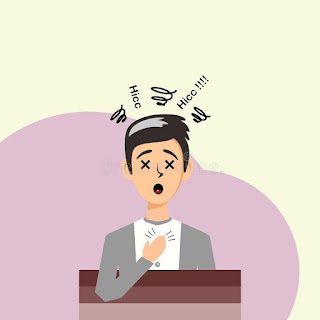What is the Definition of Hiccups?
dreamstime.com
A hiccup (singultus) is a sudden involuntary contraction of the diaphragm, and generally occurs over and over again every minute. Air that suddenly passes into the lungs causes the glottis (space between the vocal cords) to close, and causes the “HIK” sound to occur.
Hiccups are a reflex movement of the body that occurs when the diaphragm muscle contracts or tightens suddenly. As a result, the air is suddenly drawn in through the mouth and makes a "CHUCK" sound.
What Causes Hiccups?
- Eating and drinking too fast
- Eating and drinking too much
- Very emotional
- Immediately drink cold water (ice) after eating hot or spicy foods.
- Laughing too hard
- Cough too hard
- Phrenic nerve compression by other anatomic structures
- Kidney illness
- Bad behavior, for example: smoking
- Inadequate electrolyte balance
- Presence of a foreign object in the ear
- Irritation of the phrenic and phrenic nerves
- As a result of cold air around our bodies, it can be caused by AC (Air Conditioner) or fans.
What are the Symptoms of Hiccups?
There is a small thump every minute and a "Hik" sound. It occurs due to a sudden involuntary contraction of the diaphragm. Symptoms of hiccups can also be caused by pressure on the phrenic nerve by other anatomical structures.
Will the hiccups go away on their own?
Hiccups will generally go away on their own, although there are some home remedies to speed up the healing of hiccups in children/toddlers, and there are some medications that are needed.
Are Hiccups in Babies Dangerous?
Hiccups in babies is actually a natural thing and is commonly experienced by all babies, especially babies under the age of 1 year. Hiccups in infants indicate normal respiratory development.
How to Deal with Hiccups
- Try giving your baby fluids in the form of milk or warm water.
- Do not feed the baby in too large a quantity
- Do a gentle pat on the back (either baby or adult) on the baby by placing the baby upright on your shoulder and then gently patting the back.
- Make sure the pacifier hole given to the baby is not too big. The teat opening is too large, causing a large volume of milk to be swallowed and a lot of air being swallowed, this causes gastric distension which will trigger hiccups.
- Holding your breath, because holding your breath increases the level of carbon dioxide in the blood, which can cause the hiccups to stop.
- Breathe in a paper bag
- Drink a glass of cold water slowly little by little
- Chewing dry bread or shaved ice
- Pulling the tongue by hand
- Rub the eyeball slowly
- Reverse the body position by placing the head under the feet above
- Sleep lying down with both knees bent towards the stomach
- Swallow the sugar in one teaspoon
- Take a shower and wash your hair with ice cubes
- Swim in cold water with a temperature of 20-25 degrees for at least 20 minutes
- Breathe calmly.
REFERENCES
- Priyono, Yunisa. 2010.
- Persie, Van Azis. 2014.